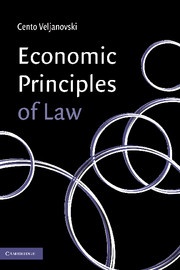2 - The economic approach
Published online by Cambridge University Press: 03 December 2009
Summary
Incentives are the essence of economics.
Edward Lazaar, 1998The purpose of studying economics is … to learn how to avoid being deceived by economists.
Joan Robinson, 1955Economics, declared John Maynard Keynes over half a century ago, does not offer a body of furnished conclusions, but an approach; a way of thinking about a problem. Its approach centres on choice, trade-offs, consequences, incentive effects, costs and benefits. As such, economics offers a different and external perspective on legal problems which can shed new insights, reveal new relationships and perhaps explain more clearly the law and its effects. The basic economics useful for legal analysis is set out in this chapter.
CHOICE AND SCARCITY
The economic approach to law can be defined as the application of economic theory – mostly price theory and statistical methods – to examine the formation, structure, processes and impact of the law and legal institutions. It employs the same economics used to study the market for beans and steel to analyse law and institutions. This is known as price theory, the study of the interaction and behaviour of individual units in the economy – the firm, the consumer and the worker.
At the heart of price theory are the concepts of scarcity and choice. Without scarcity there would be no need to make choices since in a world of inexhaustible abundance we would simply take what we wanted. Scarcity, whether in rationing the law or allocating resources, involves choice.
- Type
- Chapter
- Information
- Economic Principles of Law , pp. 19 - 57Publisher: Cambridge University PressPrint publication year: 2007



